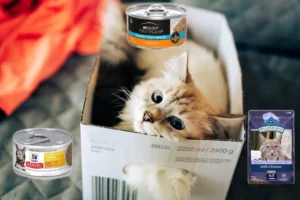Cats are fascinating creatures with unique dietary needs. One essential nutrient for their health is vitamin B12. But why do cats need B12?
Vitamin B12 is crucial for cats’ overall health and well-being. From energy production to nerve function, B12 plays a vital role in various bodily functions of our feline friends. Let’s explore why cats need B12 and how you can ensure they are getting enough of this important vitamin.
The Importance of Vitamin B12 for Cats
Vitamin B12, also known as cobalamin, plays a crucial role in maintaining the overall health and well-being of our feline friends. This essential vitamin is responsible for various bodily functions, including the production of red blood cells, maintenance of the nervous system, and DNA synthesis. Without an adequate supply of Vitamin B12, cats can experience a range of health issues, from anemia to neurological problems.
Moreover, Vitamin B12 is essential for energy production and helps cats metabolize proteins and fats, ensuring they have the necessary nutrients to thrive. Incorporating B12 into their diet is vital for supporting their immune system and overall vitality. Cats can’t produce Vitamin B12 on their own, so it’s crucial to provide them with this essential nutrient through their diet.
To ensure your beloved feline companions stay healthy and energetic, make sure their diet includes sufficient amounts of Vitamin B12-rich foods or supplements recommended by your veterinarian. Whether it’s canned cat food, liver, fish, or special B12 supplements, providing them with this essential nutrient is a key aspect of caring for your cat’s health.
Signs of B12 Deficiency in Cats
Recognizing the signs of Vitamin B12 deficiency in cats is crucial to maintaining their health and well-being. Common symptoms of B12 deficiency in felines include lethargy, weakness, loss of appetite, weight loss, diarrhea, and neurological issues, such as coordination problems and muscle weakness.
If you notice any of these symptoms in your cat, it’s essential to consult your veterinarian for proper diagnosis and treatment. Untreated B12 deficiency can lead to more severe health issues, affecting your cat’s quality of life.
In addition to addressing B12 deficiency through dietary changes or supplements, it’s essential to monitor your cat’s overall health and ensure they receive regular veterinary check-ups. By staying proactive and attentive to your cat’s health needs, you can help them lead a happy and healthy life.
Remember, your furry friends rely on you to provide them with the essential nutrients they need to thrive, including Vitamin B12. By understanding the importance of B12 and recognizing the signs of deficiency, you can proactively care for your cat’s well-being and ensure they live their best life.
Dietary Sources of B12 for Cats
When it comes to why cats need B12, it’s all about keeping those little furballs healthy and full of energy. So, where can you find this essential vitamin for your feline friends? Look no further than foods like liver, fish, and eggs – they’re packed with vitamin B12 goodness. Incorporating these items into your cat’s diet can help ensure they get the B12 they need to thrive.
Top Dietary Sources of B12 for Cats:
– Liver: Whether it’s beef, chicken, or even lamb liver, this organ meat is a B12 powerhouse for your cat.
– Fish: Tuna, salmon, and mackerel are not only tasty for cats but also rich in vitamin B12.
– Eggs: Scrambled, boiled, or raw, eggs are a great source of B12 that your cat will love.
When you feed your cat a balanced diet that includes these vitamin B12-rich foods, you’re helping them stay healthy and happy. Keep those purrs coming!
B12 Supplements for Cats
If you’re worried that your cat might not be getting enough B12 from their diet alone, supplements can be a helpful addition. From B12 drops to tablets, there are various options available to ensure your feline friend gets the right amount of this essential vitamin. When considering B12 supplements for your cat, it’s essential to consult with your veterinarian to determine the best choice and dosage.
Remember, supplements should never replace a healthy diet but can complement it when needed. By providing B12 supplements as directed by your vet, you can support your cat’s overall well-being and help maintain their vitality for years to come. Your furry friend will thank you with plenty of cuddles and purrs!
Health Benefits of Sufficient B12 Levels
Ensuring your cat has sufficient levels of vitamin B12 can greatly benefit their overall health. Vitamin B12 plays a crucial role in maintaining a healthy nervous system in cats, helping to prevent neurological issues and promote proper brain function. Additionally, B12 aids in the production of red blood cells, which are essential for carrying oxygen throughout the body. This vitamin is also vital for maintaining a healthy metabolism and promoting energy levels in your feline friend. By incorporating sufficient B12 into your cat’s diet, you can help support their immune system and prevent deficiencies that may lead to serious health issues.
B12 Testing for Cats
If you suspect your cat may have a vitamin B12 deficiency, it’s essential to have them tested by a veterinarian. Blood tests can determine your cat’s B12 levels accurately. If your cat’s levels are low, your vet may recommend supplementing their diet with B12 injections or oral supplements. It’s crucial to monitor your cat’s B12 levels regularly, especially if they have pre-existing health conditions that may impact their ability to absorb this vital vitamin. Remember, timely testing and intervention can help prevent serious health complications associated with B12 deficiency.
Helpful Resource: For more information on B12 testing for cats, consult this veterinary guide on blood tests for valuable insights.
Interesting Facts About Vitamin B12 and Cats
Did you know that vitamin B12 is essential for cats’ overall health and well-being? This crucial nutrient plays a vital role in maintaining a healthy nervous system, promoting red blood cell production, and supporting proper brain function in our feline friends. Without an adequate supply of B12, cats can experience a range of health issues, including anemia, neurological problems, and lethargy.
Ensuring that your cat receives enough vitamin B12 in their diet is crucial for their optimal health. Whether you choose to provide a balanced commercial cat food or supplement their diet with B12-rich foods, such as organ meats like liver, it’s essential to prioritize this vital nutrient to support your cat’s longevity and vitality.
Here are some key tips to help you ensure your cat is getting enough B12 in their diet:
- Incorporate B12-rich foods like liver, kidney, and fish into your cat’s meals to boost their intake of this essential nutrient.
- Consult with your veterinarian to determine the best diet plan for your cat’s individual needs and ensure they are receiving adequate B12 levels.
- Keep an eye out for signs of B12 deficiency in your cat, such as weakness, weight loss, and changes in behavior, and seek veterinary care if necessary.
With a little extra attention to your cat’s nutritional needs, you can help ensure they lead a happy, healthy life filled with vitality and energy.
For more in-depth information on the importance of vitamin B12 for cats and how to support your feline companion’s well-being, check out this informative resource from the American Association of Feline Practitioners: AAFP Feline Nutrition Guidelines
Alex, a passionate animal lover, has experience in training and understanding animal behavior. As a proud pet parent to two dogs and three cats, he founded AnimalReport.net to share insights from animal experts and expand his knowledge of the animal kingdom.




